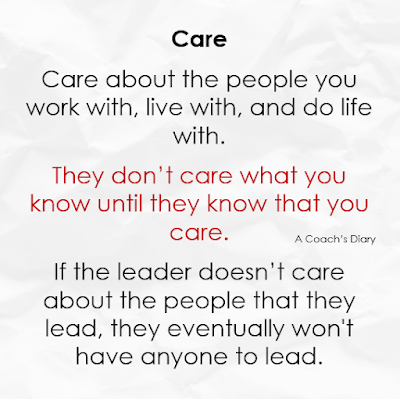The Case for Belonging
I heard a dad once ask another dad, “Do you and your daughter ever just go outside and shoot?”
The dad being questioned was worried because his daughter wasn’t performing to her full potential on the basketball court, and this was the other dad’s subtle way of reminding him that the game should be fun and there should be some unstructured, fun moments where a dad can shoot with his daughter without focusing on achievement and the score.
Sports can be both fun and competitive, and when done right, they can help us learn more about ourselves and grow as people.
But we often place more of an emphasis on success and achievement than on mental health, well-being, joy.
School culture can be very similar. We often spend more time focusing on achievement and test scores than on the well-being and social and emotional health of the people we work with and the students we teach. The classroom can be so focused on achievement that we often value people for what they do and can achieve over who they are.
We live and work in a society that values trophies and test scores above belonging and well-being, but research and psychology show that hope, well-being, and achievement come after belonging and not before it.
When people feel that they belong, they aren’t distracted and worried about being treated differently or as a stereotype. They don’t put time and energy into trying to fit in or worry as much about what others think about them and their differences.
When people feel like they belong, they can put all of their focus into becoming the best version of themselves.
Belonging is an essential part of the human experience, and research shows that our relationships are the greatest indicator of success, well-being, and happiness.
Belonging affects how we perform and how we feel. Former U.S. Surgeon General Vivek H. Murphy said that the lack of belonging in society is a growing health epidemic. The rate of loneliness in our country has doubled since the 1980s.
Studies show that loneliness is a greater health risk than obesity, and it is comparable to smoking almost one pack of cigarettes a day.
People who are deeply connected to someone or to a group or community but have unhealthy habits (like smoking and alcohol) consistently outlive people who have extremely healthy habits but are not relationally connected to any group.
The quality of your life is a direct reflection of the quality of your relationships.
In the 1940s, psychologist Abraham Maslow developed Maslow’s hierarchy of needs after a 6-week visit to the Blackfoot nation. He found that motivation depends on the fulfillment of certain human needs, and he even ranked them in order, and belonging comes before self-esteem and achievement:
1 - Physiological
2 - Safety
3 - Belonging
4 - Self-Esteem (and achievement)
5 - Self-Actualization
We need to feel like we belong in order to achieve, and our self-worth and self-esteem rise when we have a community, team, or classroom in which we feel like we belong.
When we put achievement over belonging, we are skipping a step in Maslow's process, and we are creating unhealthy, toxic environments where we run the risk of damaging our students, our athletes, and our educators' well-being, health, and performance. When we use achievement to determine who is worthy and who is not, it can lead to higher dropout rates, lower teacher retention, stress, anxiety, exhaustion, and burnout.
When people have to spend their time and energy worrying about fitting in, this belonging uncertainty negatively affects their performance, satisfaction, and hope. This creates gaps that not everyone is able to climb out of, and gaps nobody should have to climb out of.
We are hardwired for connection. We are more confident and perform better when we are seen and valued for who we are.
We can’t achieve at the highest level or reach our fullest potential if we don’t feel like we belong, and as coaches, educators, leaders, and parents, it’s our job to intentionally design, create, and cultivate an environment where everyone feels like they belong, like they are valued, and where they are safe to be who they are.
Barriers to Belonging
- Prioritizing achievement over well-being
- Dehumanizing language like ‘those kids,’ instead of ‘our kids,’ or, ‘those people,’ instead of, ‘our people.’
- Undervaluing the home cultures of the people we live with, work with, and play with
- Requiring achievement in order to belong
Negative Effects of a Lack of Belonging
- Lower achievement and performance
- Loneliness and depression
- More energy spent on fitting in than achieving
How to Overcome Barriers To Belonging
- Validate, validate, validate the thoughts, feelings, experiences, and cultures of others.
- Appreciate, admire, and honor the diversity that everyone brings.
- Accept and embrace people completely for who they are without conditions.
- Treat everyone fairly. Have fair and just interactions and meaningful accountability. Fair treatment may require different approaches to meet different needs.
- Care. Care about the people you work with, live with, and do life with. You won’t like everything about everybody, but you can genuinely care about everyone as a person. They don’t care what you know until they know that you care, and if the leader doesn’t care about the people that they lead, they eventually won't have anyone to lead.
Resources
1 - Cobb, F. and Krownapple, J. (2019). Belonging Through a Culture of Dignity: The Keys to Successful Equity Implementation. Mimi and Todd Press.
2 - Maslow. A.H. (1943). A Theory of Human Motivation. Classics in the History of Psychology. http://psychclassics.yorku.ca/Maslow/motivation.htm







Comments
Post a Comment